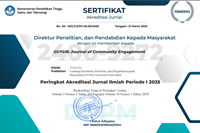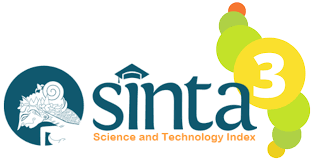Amelia Setyawati, Sudarmiatin Sudarmiatin, & Ludi Wishnu Wardana. (2023). Empowering MSMEs: The Impact Of Financial Literacy And Inclusion: Systematic Literature Review. International Journal of Economics and Management Research, 2(3), 121–138. https://doi.org/10.55606/ijemr.v2i3.132
Aziz, M. S., Ilham, M., & Santi, M. (2025). Inclusiveness of Muslim Da’wah and Entrepreneurship for Persons with Disabilities through Social Media Based on Gus Dur’s Islamic Spirituality. Al-Muraqabah: Journal of Management and Sharia Business, 5(1), 60–79. https://doi.org/10.30762/al-muraqabah.v5i1.2297
Bansal, N., & Choudhary, H. (2024). Fostering digital equity: Evaluating impact of digital literacy training on internet outcomes in rural marginalised communities in India. International Journal of Lifelong Education. https://www.tandfonline.com/doi/abs/10.1080/02601370.2024.2347327
Dana, L.-P., Gurău, C., Hoy, F., Ramadani, V., & Alexander, T. (2021). Success factors and challenges of grassroots innovations: Learning from failure. Technological Forecasting and Social Change, 164, 119600. https://doi.org/10.1016/j.techfore.2019.03.009
Dushkova, D., & Ivlieva, O. (2024). Empowering Communities to Act for a Change: A Review of the Community Empowerment Programs towards Sustainability and Resilience. Sustainability, 16(19), 8700. https://doi.org/10.3390/su16198700
Gerlich, M. (2025). AI Tools in Society: Impacts on Cognitive Offloading and the Future of Critical Thinking. Societies, 15(1), 6. https://doi.org/10.3390/soc15010006
Hasan, Z. (2024). THE IMPACT OF DIGITAL FINANCIAL LITERACY ON CONSUMER PROTECTION, INVESTOR SECURITY, AND FINANCIAL TRANSACTIONS IN INDONESIA. International Journal of Islamic Economics and Finance Research, 7(2 December), 55–77. https://doi.org/10.53840/ijiefer165
Hung, N. T. (2023). Green investment, financial development, digitalization and economic sustainability in Vietnam: Evidence from a quantile-on-quantile regression and wavelet coherence. Technological Forecasting and Social Change, 186, 122185. https://doi.org/10.1016/j.techfore.2022.122185
Kalayou, M. H., Endehabtu, B. F., & Tilahun, B. (2020). The Applicability of the Modified Technology Acceptance Model (TAM) on the Sustainable Adoption of eHealth Systems in Resource-Limited Settings. Journal of Multidisciplinary Healthcare. https://www.tandfonline.com/doi/abs/10.2147/JMDH.S284973
Koskelainen, T., Kalmi, P., Scornavacca, E., & Vartiainen, T. (n.d.). Journal of Consumer Affairs | ACCI Consumer Research Journal | Wiley Online Library. https://doi.org/10.1111/joca.12510
M., M. K., Almuraqab, N., Moonesar, I. A., Braendle, U. C., & Rao, A. (2024). How critical is SME financial literacy and digital financial access for financial and economic development in the expanded BRICS block? Frontiers in Big Data, 7. https://doi.org/10.3389/fdata.2024.1448571
Machado Becker, A., Ferreira Da Silva, P., Ayala, N. F., & Zomer, T. (2025). Exploring the factors influencing digital transformation in micro and small-sized enterprises in an emerging country: A sociotechnical systems perspective. International Journal of Productivity and Performance Management. https://doi.org/10.1108/IJPPM-11-2024-0793
Mahyarni, M., & Okfalisa, O. (2024). SMEs digitalization readiness in supporting Sharia fintech: Framework development using quadruple perceives in fuzzy analytical hierarchy process (FUZZY AHP). Serbian Journal of Management, 19(1), 71–97. https://doi.org/10.5937/sjm19-44971
Martínez-Peláez, R., Ochoa-Brust, A., Rivera, S., Félix, V. G., Ostos, R., Brito, H., Félix, R. A., & Mena, L. J. (2023a). Role of Digital Transformation for Achieving Sustainability: Mediated Role of Stakeholders, Key Capabilities, and Technology. Sustainability, 15(14), 11221. https://doi.org/10.3390/su151411221
Martínez-Peláez, R., Ochoa-Brust, A., Rivera, S., Félix, V. G., Ostos, R., Brito, H., Félix, R. A., & Mena, L. J. (2023b). Role of Digital Transformation for Achieving Sustainability: Mediated Role of Stakeholders, Key Capabilities, and Technology. Sustainability, 15(14), 11221. https://doi.org/10.3390/su151411221
Menberu, A. W. (2024). Technology-mediated financial education in developing countries: A systematic literature review. Cogent Business & Management. https://www.tandfonline.com/doi/abs/10.1080/23311975.2023.2294879
Newsom, L. C., Miller, S. W., & Chesson, M. (2021). Use of Digital vs Printed Posters for Teaching and Learning in Pharmacy Education. American Journal of Pharmaceutical Education, 85(6), 8307. https://doi.org/10.5688/ajpe8307
Purwanto, H., Adi, H. I. S., Astuty, H. S., & Suwarno. (2024). The Influence Of Perceived Ease Of Use On The Intention To Use Digital Payment Applications In Transactions. Jurnal Ilmiah Ekonomi Global Masa Kini, 15(2), 111–116. https://doi.org/10.36982/jiegmk.v15i2.4813
Surya, B., Hernita, H., Salim, A., Suriani, S., Perwira, I., Yulia, Y., Ruslan, M., & Yunus, K. (2022). Travel-Business Stagnation and SME Business Turbulence in the Tourism Sector in the Era of the COVID-19 Pandemic. Sustainability, 14(4), 2380. https://doi.org/10.3390/su14042380
Vijayakumar, V., & Chandrasekar, K. (2024). The Moderating Effect of Digital Literacy on the Digital Financial Services and Financial Behaviour of
 (Universitas Pendidikan Nasional)
(Universitas Pendidikan Nasional) 









.png)
